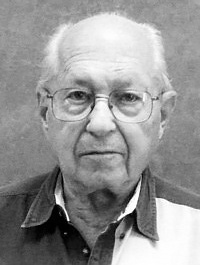
Dr. Ervin J. Fenyves
Dr. Ervin J. Fenyves, a distinguished international researcher who served on the physics faculty at The University of Texas at Dallas for more than 40 years, died Oct. 14 at the age of 90.
Fenyves began his career at UT Dallas in 1970 and retired as a professor emeritus of physics in 2011. His research areas included nuclear and high-energy physics, astrophysics and the development of advanced particle detectors. From 1989 to 1992, Fenyves also was an adjunct professor of radiology at UT Southwestern Medical Center.
Born in Budapest, Hungary, in 1924, Fenyves began his university studies in mathematics and physics before World War II. Soon after Germany occupied Hungary in 1944, he was deported to a labor camp, where he became a medic and eventually escaped. When he resumed his studies after the war, he earned a degree in pharmacy as well as a degree in physics and mathematics.
Fenyves went on to earn a PhD in physics from Eötvös Loránd University in Budapest and a doctor of physical sciences degree from the Hungarian Academy of Sciences. He held several academic and research appointments, including professor at Eötvös Loránd University; head of the Laboratory of Cosmic Rays and deputy scientific director of the Central Research Institute for Physics at the Hungarian Academy of Sciences; and vice director of the Joint Institute for Nuclear Physics in Dubna, Russia.
From 1968 to 1969, Fenyves was head of the physics section of the United Nations’ International Atomic Energy Agency in Vienna, Austria, where he aided enforcement of the nuclear nonproliferation treaty.
“Ervin Fenyves was one of the longest-standing members of our university and a valued member of the high-energy physics group. Ervin had a brilliant mind, an incredible memory, wide-ranging interests and a great talent for explaining complicated matters in simple terms. He will be sorely missed.”
Dr. Wolfgang Rindler,
an expert in relativity who has been a professor of physics at UT Dallas since its founding
In 1969, Fenyves emigrated to the U.S. with his wife, Vera, and son, Andrew, while their adult daughter Eva remained in Hungary. Fenyves spent a year at the University of Pennsylvania as a visiting researcher before joining the UT Dallas faculty as a physics professor in 1970.
The late Dr. Istvan Ozsváth, a professor of mathematics, a fellow Hungarian and one of the founding faculty members of UT Dallas, was instrumental in bringing Fenyves to the University. His wife, Dr. Zsuzsanna Ozsváth, the Leah and Paul Lewis Chair of Holocaust Studies, professor of literature and the history of ideas, and director of the Holocaust Studies program, said Fenyves was a man of many jokes.
“He also liked children, always playing chess with and explaining physics to our young children,” Ozsváth said.
Fenyves’ research included studies in cosmic-ray physics and related experimental techniques, as well as high-energy and elementary particle physics and neutrino physics. He collaborated with researchers at other institutions to develop sensitive neutron detectors, which have applications not only in particle physics research, but also in the detection of shielded nuclear weapons within cargo.
“Ervin Fenyves was one of the longest-standing members of our university and a valued member of the high-energy physics group,” said Dr. Wolfgang Rindler, an expert in relativity who has been a professor of physics at UT Dallas since its founding. “Ervin had a brilliant mind, an incredible memory, wide-ranging interests and a great talent for explaining complicated matters in simple terms. He will be sorely missed.”
A member of the Hungarian Academy of Sciences, Fenyves received several honors throughout his career, including the Brodi-Schmidt Prize from the Hungarian Physical Society, the Prize for Books from the Hungarian Academy of Sciences and the 1965 Hungarian National Prize (Kossuth Prize), a state-sponsored award that at the time acknowledged outstanding achievements in science, culture and the arts.
At UT Dallas, Fenyves oversaw several doctoral students, and taught both undergraduate and graduate courses in nuclear physics, energy resources, nuclear safety and modern physics. He also served as chairman of the international organizing committee for the Texas Symposium on Relativistic Astrophysics.
Fenyves was preceded in death by his wife. He is survived by his son, Dr. Andrew Fenves, a graduate of UT Southwestern Medical School and a physician in Boston; his daughter, Eva Salamon, a pharmacist who resides in Bethesda, Maryland; three grandchildren; and seven great-grandchildren.